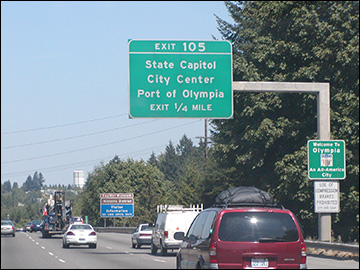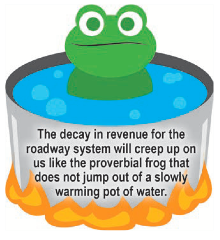Washington State Edges Closer to Taxing Drivers by the Mile
Lawmakers ludicrously claim tax-per-mile needed to offset prevalence of fuel-efficient cars
Adan Salazar
Infowars.com
January 31, 2014
Infowars.com
January 31, 2014
Lawmakers in Washington state are edging closer to implementing a new system that would monitor and tax drivers based on miles driven, under a new highway funding proposal.
In a dizzying twist of logic, the Transportation Commission blames the prevalence of fuel-efficient cars as the reason the state now needs a per-mile tax, arguing that “the move to cleaner, smarter vehicles must be accompanied by a change in the way we pay for our roads.”
“According to the study, drivers could be charged three ways; either with a flat-fee, by having odometers checked, or with an electronic device installed in cars to measure how many miles are driven,” a King 5 News report states.
Last week, a committee set up by the Transportation Commission, after conducting a $1.4 million study, reported the fee could generate upwards of $3 billion. By 2015, Wasington lawmakers hope to roll out a pilot program in order to gauge the amount of public resistance to the new tax.
As expected, however, not everyone is happy with the idea of having to pitch in to help the state. “I choose to drive a car that takes less gas,” Portland resident Hayley Ramerman says, “so I think I shouldn’t have to be charged more because I’m choosing to drive a car that is more fuel efficient.”
Others are concerned the technology used by the state to monitor driving habits poses broad privacy rights violations. “[I]t’s the “black box” system in particular that’s untenable: It would force us to surrender our privacy,” Mark Perry, a scholar with the American Enterprise Institute, said last year. “Each day more and more of us are required to tell government agencies more and more about ourselves. Do we really want the government collecting data about driving habits?”
Last year, Oregon launched its own tax-per-mile scheme and began charging drivers a 1.5 cent fee. And it’s going to get worse before it gets any better.
“The incentive for states to pursue this kind of program could build as cars become more fuel efficient, especially considering President Obama wants new vehicles to get 54.5 mpg by 2025, up from the average now of 23.5 mpg’s,” according to a report filed by Fox News.
As Infowars and others have exposed, these measures have been long in coming. Since as early as 1997, radio host Alex Jones has been warning of a plan to put GPS tracking devices in all vehicles. Now people, like the executive director of the Southern California Assn. of Governments, are claiming “This really is a must for our nation.”
Since 2004, state legislators have waged an uphill battle attempting to convince citizens to sign on to similar taxes. According to one non-scientific poll, conducted by a local TV station in California, however, 95 percent of viewers, out of 339 people who voted, were against the tax.
In the grander scheme, the plan to tax per mile ultimately follows goals set forth in the United Nation’s notorious Agenda 21 action plan, which among other things purportedly seeks to “Encourage economic policies conducive to sustainable development.”



No comments:
Post a Comment
Thanks for commenting. Your comments are needed for helping to improve the discussion.